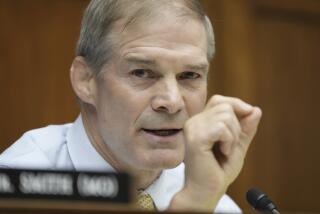Open Doors on Debate
- Share via
When the Senate convenes in the coming days to decide--for only the second time in American history--whether a sitting president should be removed from office, it will do so behind closed doors, unless it first acts to change its rules.
That’s because current Senate rules--written more than 130 years ago for the impeachment trial of President Andrew Johnson--permit witnesses to be questioned and lawyers to debate in open session, but allow all debate and deliberations by senators--even on the question of the president’s guilt or innocence--to be held in private. The secrecy even extends to deliberations about trial procedures, such as the calling of witnesses.
This is wrong. As President Gerald Ford said in 1976, “In a democracy, the public has a right to know not only what the government decides, but why and by what process.”
The need for openness and accountability far outweighs any arguments supporting secrecy.
* Some argue that the Senate functions as a jury, and jurors deliberate in secret. But the Senate is much more than a jury. Senators determine the law, not just the facts. At bottom, the impeachment decision is not a vote taken by a sequestered jury but a vote by the people’s elected representatives on the people’s business.
* Some argue that senators need to work in private to be able to forge bipartisan compromises. Ensuring that the Senate debate is public, however, does not prevent senators from holding similar caucuses in private or stop Senate leaders from meeting together to develop bipartisan solutions.
* Some argue that TV coverage will tempt senators to play to the cameras, indulging in highly charged partisan rhetoric. But surely senators can find the self-discipline to comport themselves well, even in the glare of media attention.
* Some argue that the impeachment proceedings are unique, and in unique circumstances--discussions of personnel matters or sensitive defense information--elected officials may meet in private. But it is difficult to recall any other proceeding in American history that has been more open to public scrutiny up until this point. All the impeachment proceedings in the House were public. The House released the president’s videotaped deposition before a grand jury, even though grand jury proceedings are always secret. Legislators have released testimony and documents gathered by the independent counsel, regardless of the sensitivity or explicitness of their contents. It is simply not credible to insist at this late juncture that the impeachment deliberations demand secrecy.
A two-thirds vote is needed to change these impeachment rules; the Senate should act to do so. This veil of secrecy has no place in an American democracy at the dawn of the 21st century. In this era of instantaneous mass communications, citizens properly consider openness in government one of their rights. Now C-Span carries congressional floor debates to Americans throughout the country. The Internet gives minute-by-minute updates on public affairs. E-mail links millions to their elected representatives. This access should not now be choked off by outdated and restrictive rules.
Common Cause founder John Gardner may have put it best when he remarked in 1974: “Secrecy is fatal to accountability.” Citizens, as participants in a democratic society, should be able to witness the Senate impeachment debate.
More to Read
Get the L.A. Times Politics newsletter
Deeply reported insights into legislation, politics and policy from Sacramento, Washington and beyond. In your inbox twice per week.
You may occasionally receive promotional content from the Los Angeles Times.










